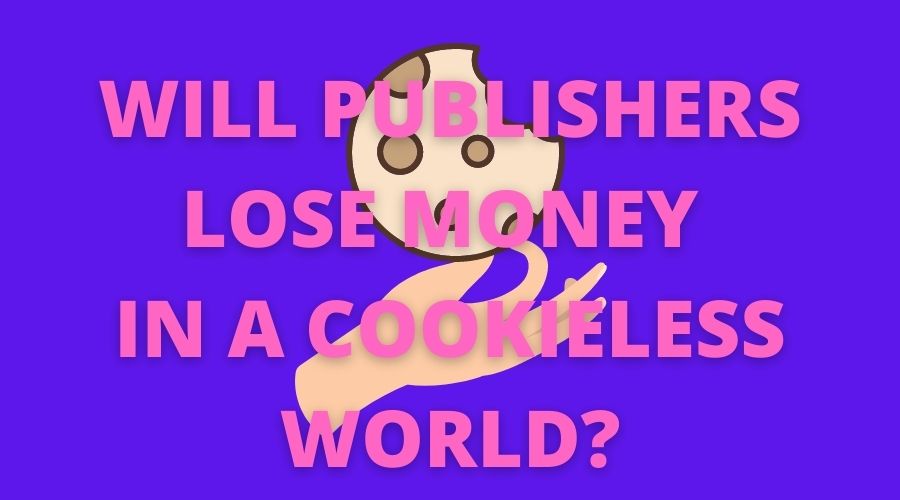
As we stand at the precipice of the AI revolution era in programmatic advertising, a burning question has taken center stage: “Will publishers lose money in a cookieless world?”
With the withdrawal of third-party cookies imminent, publishers need to be aware of developments and how going cookieless will affect them. In this guide, we’re going to delve into this issue & how publishers can navigate in a cookieless world.
Cookies were created in the early ’90s by web developers who wanted to figure out ways to track user behavior online. The aim originally was to analyze a page’s unique visitors and discover their behavior patterns from the point of view of site improvement, but eventually, they were used to track individuals and target them with either ads or promotions.
As the digital age progressed, there was growing unease among users and regulators about the volume and depth of personal data that companies held. The concern wasn’t just about the collection but also about potential misuse, breaches, and a fundamental invasion of privacy.
In response, a series of stringent data protection regulations emerged globally. The California Consumer Privacy Act (CCPA) sought to empower Californians with control over their personal data. Europe’s General Data Protection Regulation (GDPR) went a step further, setting forth a blueprint for data protection with provisions that reverberated worldwide.
Google feels that the amount of user data that has historically been collected by cookies has eroded the trust of users, with a majority of users feeling that the costs of giving up personal information to advertisers outweigh the potential benefits.
With advances in ad blocking and cookie blocking, Google has found that widespread blocking of cookies has led to advertisers and developers using other more invasive techniques, such as matching user behavior to previously identified patterns. These cannot be cleared or deleted in the same way as a cookie, giving users less control over what is stored about them.
On the other hand, the easy and blanket blocking of cookies drastically reduces the effectiveness of online targeted advertising, leading to reduced ad spending and lower revenue for publishers.
Third-party cookies have been the linchpin of online advertising for decades. Leveraging user data to craft personalized advertisements, they’ve empowered publishers to deliver more targeted, and consequently, more effective campaigns. However, mounting concerns over user privacy and data misuse have catapulted us towards an imminent cookieless future.
The important things to note are relevant laws surrounding data privacy, which many publishers are already aware of and using. You must get consent from the user if you intend to hold personal data, or use an advertiser that intends to do so.
You should also keep up to date with developments in this space (easily done by following MonetizeMore’s blog) and think about how the changes will affect you. In the short term, advertisers might see fluctuations in returns as new technologies are implemented, which might impact revenue.
The transition to a cookieless world introduces both challenges and opportunities for publishers. Here’s why:
At the forefront, there are genuine apprehensions about potential revenue dips. With the loss of personalized targeting capabilities that cookies provided, there could be reduced efficiency in ad campaigns, leading to lower click-through rates and, by extension, diminished revenues for publishers.
While the cookie crumbles, it paves the way for emergent technologies. Contextual targeting, which focuses on the content of a page rather than user behavior, is witnessing a renaissance. Similarly, device fingerprinting, unified ID solutions, and first-party data collection are becoming pivotal in this evolving landscape.
A cookieless world can potentially enhance the trust quotient between users and publishers. With more transparent data practices and reduced reliance on invasive tracking methods, publishers have an opportunity to foster a more trusting relationship with their audiences.
Replacing cookies hasn’t proved simple. At the beginning of 2021, Google came up with Federated Learning of Cohorts (FLoC) to replace third-party cookies. There were immediate privacy concerns and Google withdrew FLoCs in favor of Topics API. Topics API groups users’ browsing habits into 350 categories. Up to 5 topics are then stored by the browser, which remembers them for three weeks before deleting them. This data is stored locally and does not involve external servers.
When the user visits a site, Topics API shows three of five interest categories to the site and its advertising partners. Topics API also combines multiple interests. For example, it can identify a cosmetics lover who is also into cooking. Google doesn’t parse the text within the blog posts to determine the relevant interest. Sites opt into Topics API and supply the interest topic of their page/site, and only if it supplies topics will a site receive topic-based information.
However, we’re still waiting to see how effective this will be, and how much of the industry will adopt it (Topics API is browser-specific and so far is only available on Chrome). The good thing about Topics API though is that users can control what topics (if any) are shared and as Chrome limits, the amount of shared data, the chance for ‘fingerprinting’ is reduced (identifying users personally based on their browsing habits).
This hasn’t gone away and probably never will, simply because first-party data is so powerful. Publishers are relying more and more on information directly supplied by users such as email addresses which can be used for targeting and customer retention. In conjunction with privacy laws, this data should be held securely and transparently, and publishers should seek to reassure customers on the safety of their data.
The data that publishers receive from their audiences directly as part of a clear value exchange is zero-party data. In this case, customers intentionally share their data with brands. This includes how the individual wants to be recognized, their personal context, and purchase intentions. Zero-party data shows how engaged audiences are, how much they’re willing to share, what they like, and what they want. Publishers can gather zero-party data through newsletters, surveys & feedback forms, subscription signups, contest giveaway submissions, etc.
Related Read: https://www.monetizemore.com/blog/what-is-zero-party-data
Contextual advertising is primed to make a significant comeback. By aligning ads with the content on the page, it offers a non-intrusive and highly relevant advertising experience.
For publishers, the resurgence of contextual advertising in the cookieless era presents multiple advantages:
Stay abreast with the rapid advancements in advertising technology. Partner with innovators who are developing next-gen solutions tailored for the cookieless era. By partnering with MonetizeMore at the forefront of innovation, publishers can access tools that offer precise targeting without relying on third-party cookies.
The shift from a cookie-dependent ecosystem is not just a technical transition but also a conceptual one. The entire advertising paradigm is undergoing a metamorphosis. It’s paramount to ensure that all stakeholders – advertisers, partners, and even users – understand the changing dynamics. Continuous education and transparent communication will be key. By being proactive, publishers can ensure that the transition to a cookieless world is a collective effort, where every stakeholder is informed, aligned, and prepared for the future.
So, the industry is changing the way we target and segment our audiences for advertising in a big way, and at Monetize More we’re all good with it since user privacy and safety is a basic right. Users accept that ad content is necessary, and they’re generally accepting of targeted ads as long as they feel that their anonymity is maintained.
For quite some time now, we’ve known that cookies aren’t the perfect way to solve the problem, but they’re certainly an essential component of any web application currently. MonetizeMore has been keeping an eye on cookieless solutions for years, and we are developing our own solutions to ensure you can still maximize your ad revenue in a cookie-less world.

With over seven years at the forefront of programmatic advertising, Aleesha is a renowned Ad-Tech expert, blending innovative strategies with cutting-edge technology. Her insights have reshaped programmatic advertising, leading to groundbreaking campaigns and 10X ROI increases for publishers and global brands. She believes in setting new standards in dynamic ad targeting and optimization.
10X your ad revenue with our award-winning solutions.